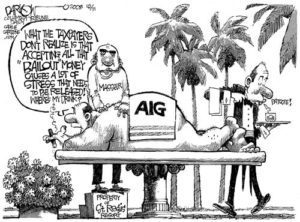
The US government is taking a clear stance against bonuses paid out by companies receiving bailout funds.
Question: What happens when an 80% shareholder of a company decides that the $165 million in bonuses contracted to employees prior to the purchase of shares are an abuse of the over $170 billion given in taxpayer bailout?
Answer: American International Group CEO, Edward Liddy, asks bonus recipients who received $100,000 or more to return at least half of the money back.
This recent chapter in the travails of the current U.S. economic crisis has become quite the controversy as it has exposed the underbelly of the federal bailout; how far can the government go in nationalizing companies before it inhibits stability and growth? A clear position from the government on the issue has begun to surface with the case of AIG, expressed quite poignantly by Massachusetts Representative and Chairman of the Financial Services Committee, Barney Frank, in a statement on CNN’s American Morning:
“The notion that we want to retain these people, that we want to pay the people who messed it up in the first place, so they don’t leave is just backwards to me… we [the government] own this company in effect, and we’re not asking that these bonuses be rescinded because we have lent money to the company, I believe we are saying as the owners of the company we do not think that we are paying bonuses or should have paid bonuses to people who made mistakes or are incompetent.”
For the complete 18 March interview with Barney Frank on American Morning, click here:
From the top, down we’re hearing the government express a relative degree of solidarity against what is being viewed by many as the misuse of bailout funds, including those vehemently against the most recent bailout’s amount of oversight. Representative Scott Garrett (R – NJ), a member of the Capital Markets Subcommittee, pointed questions toward those unhappy with AIG’s course of action, asking “What did you expect, and why weren’t you asking more questions before?” And given the sheer magnitude of monies spent by the federal government in national financial bailout, both sides of the debate are experiencing greater resistance as the government’s reach increases with the bailout’s price tag.
But just how far can the government go?
Rep. Barney Frank makes a very poignant distinction of note, later in the American Morning interview, when he mentions what is legislative vs. legal. In the case of AIG, Washington is first seeking legal action against AIG as everything from taxes on bonuses as high as 91% and lawsuits are on the table to subvert the use of funds as bonuses. New York Attorney General Andrew Cuomo even threatened the insurance company with subpoenas unless records of bonus information were revealed, using the 1921 Martin Act to gain convictions in investment related cases without proving criminal intent. (See NY’s Cuomo wins praise for pursuing AIG on bailout) And with 80% share of the company, the U.S. government is the majority shareholder and thereby has the legal voting rights on compensation packages, especially when dealing with the performance or underperformance of employees.
However, the true test of the AIG bonus fallout will be the impact of Liddy’s decision on corporate management by those companies also currently receiving federal aid. Many banks receiving funds from the original $350 billion bailout have begun to reconsider retaining these funds, citing the federal governments zealous and pliable exercise of legislative power. A 10 March New York Times article entitled “Some Banks, Feeling Chained, Want to Return Bailout Money”, found here, provides a good bit of insight into the conditions many of these institutions are wrestling with as they come to terms with the growing implications attached to this financial “lifesaver” being tossed by the federal government.
And if a clause giving shareholders (i.e. Uncle Sam) the right to vote on executive compensation packages wasn’t enough to make many of these executives nervous, House Representatives took charge on Thursday passing a bill to tax 90% of bonuses paid out since 1 January to AIG or any other company currently receiving more than $5 billion in federal aid. The Senate on the other hand has proposed a 35% tax on AIG bonuses and a 35% tax on the company; a bit milder of an alternative seeking to return a portion of taxpayer dollars toward other stimulus efforts.
From Main St. to Wall St. the argument continues on with each passing day. How will fairness and equality be delivered during this time of financial crisis. And as new theories and arguments about the best course of action will continue to develop, I’ll leave one in closing: Morton’s Fork.
Under the rule of Henry VII lived Lord Chancellor John Morton, who, in 1487, developed a policy of tax collection based in a two pronged argument: if a subject lived luxuriously he obviously had sufficient income to spare for the king, and if the subject lived frugally, he must have substantial savings from which he could afford to pay sufficient tax to the king. Dubbed Morton’s Fork, either choice of lifestyle for subjects under Henry VII’s rule painted an unfavorable conclusion, as no matter how one chose to live, he was still subject to an increased level of taxation.
As the federal government seeks economic stability and fairness, and Morton’s Fork is applied to companies decisions to choose bailout money or not, let’s hope that the windfall of increased government scrutiny over the use of funds doesn’t eclipse the bailout’s original intent: economic stimulus.